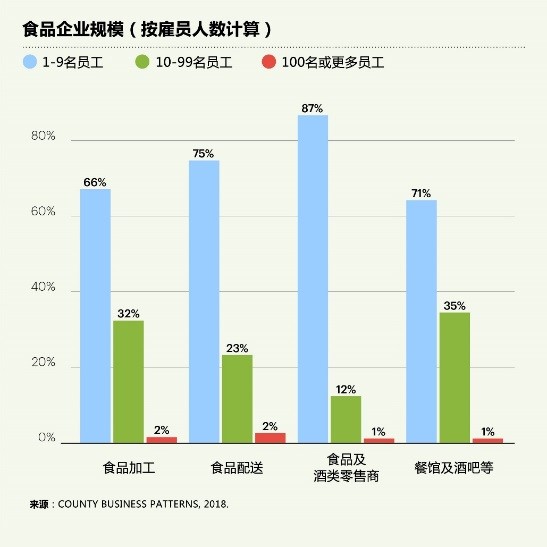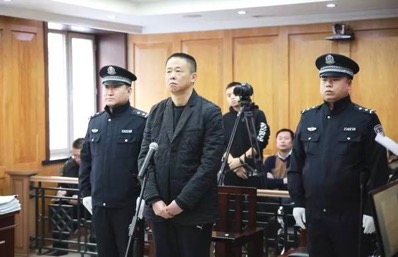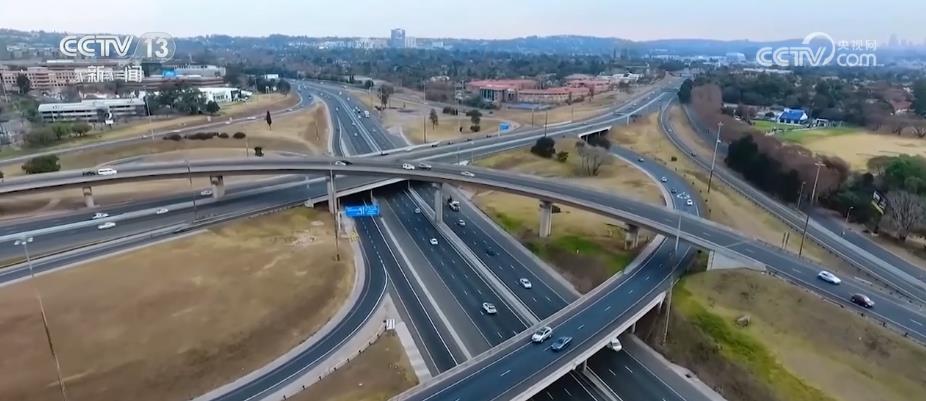In February, 2021, new york Mayor’s Food Policy Office released the first 10-year food policy plan "NYC: A 10-year food policy plan". This series consists of seven articles, translated by the team of "the other mountains all appear dwarfs under the sky.-Sustainable City and Transportation". This is the fourth article, which introduces the second goal of new york’s ten-year food policy plan: to make new york’s food economy promote economic development and provide good jobs.
New york has more than 40,000 food enterprises, employing hundreds of thousands of workers. It is difficult to calculate the exact number of workers, because there is no reliable data to explain the number of workers in the "gig economy" in food distribution. These workers and enterprises are vital to the health and well-being of new york people. The food industry is an important source of employment and property income for colored people and immigrant communities (79% of food workers in new york are colored people, including 43% Latinos and 21% Asians).
The catering industry is also very important to the city, because it is the main attraction of residents, workers and tourists, supporting many other industries, such as office employment in the central business district and attracting tourists. In fact, the catering industry is the key to making new york so attractive. Its economic contribution is also great. In 2019, the taxable sales of the catering industry reached nearly $27 billion.
However, working in the food industry or owning a business is extremely challenging. The food industry usually has a low profit margin, while the cost of running a business in new york is high. About 99% of food enterprises in the city are small enterprises with less than 100 workers, while 70% are micro enterprises with less than 10 workers. In addition, the wages of food workers are usually low, and they lack job security and mobility opportunities. Many deliverymen (an increasingly important part of the food industry) are considered as independent contract workers and cannot get the same protection and benefits as employees.
If new york wants to improve its food system, it must first support both food workers and food enterprises. The support for the two is not mutually exclusive, but mutually reinforcing. These strategies also focus on the future of food enterprises, including supporting a new ownership model that conforms to the principles of economic democracy and technological change.

Size of food enterprises in new york (calculated by number of employees). Cartography: the other mountains all appear dwarfs under the sky., the picture is from NYC Food Forward, only translated in Chinese.
Strategy 1: Protect the rights and interests of food practitioners
Implementing fair scheduling method in fast food industry
New york will strictly implement the fast food fair scheduling laws, so as to optimize the fast food industry into a benign occupation with stable and predictable working hours and wages. Strong law enforcement will ensure that workers in fast food restaurants can arrange shifts fairly and even get overtime pay when the shift schedule is temporarily changed. Law enforcement will also ensure that workers in the fast food industry can settle down through regular shifts in high-mobility industries.
Provide financial and technical support for workers’ cooperatives
The cooperative model has a long history in the food field. Worker-owned cooperatives have yet to become a powerful tool for new york to accumulate assets and eliminate the gap between the rich and the poor. In order to meet the needs of food enterprises, new york will not only coordinate existing auxiliary projects to support cooperatives, such as Employee Ownership, but also explore innovative financial and technical support projects.
When it is not appropriate for the government to directly intervene in enterprises, the New York City Government will also explore cooperation with community-based organizations, business improvement areas (BID) and merchant associations, and provide support for cooperative organization efforts in five administrative regions.
Improve the situation of food workers.
New york will promote a series of state and federal bills to improve the situation of workers in the food industry, as listed below:
(1) Ensure that all employees in the food industry are included in the federal and state welfare plans;
(2) For employers who fail to protect workers’ health, abolish relevant laws that limit their responsibilities;
(3) Change the state regulations on tip pool sharing, and expand the scope of employees who participate in tip sharing, so that employees without tips can also get some sharing;
(4) To cope with emergencies, set up a hazard pay for grass-roots food workers.
Provide support to practitioners of food programs.
New york will make efforts to provide support to practitioners of food programs. Under the circumstance that the purchasing power is restricted by the current laws, new york will first ensure that food suppliers abide by the current labor laws and collect more labor-related information from food suppliers. In addition, new york will promote the revision of applicable laws and use food procurement power to optimize the working conditions of food practitioners.
Expand child care services to solve the problem of night care for children of food practitioners.
During the COVID-19 crisis, new york deeply realized the hard work and important role of food practitioners. Child care has been provided through the Regional Enrichment Centers "and child care programs throughout the city. With the gradual recovery of the city, existing facilities for childcare projects will be expanded or new projects will be created, including night and weekend care, which is the time when children need care most and parents are most inconvenient to take care of. Providing night and weekend child care will enable parents who often work at night and weekend classes to improve their work flexibility and reduce the cost of childcare.
Feasibility study on developing basic social security benefits
New york will conduct a feasibility study on the basic social security benefits for all food workers. This study will explore the potential partnerships among food practitioners, enterprises, community organizations and financial institutions. This project focuses on providing welfare protection such as pension and medical insurance for food practitioners. New york will also push the federal government to introduce a bill to provide full and fair social security benefits for all employees, regardless of their employers, workplaces or job nature.
Strategy 2: Simplify the process, encourage innovation and support small food enterprises.
Promote tax credits for small businesses.
New york will promote state legislation and establish a tax deduction mechanism for small businesses, including the food industry, to promote the recovery of small businesses in new york. Eligible enterprises with a total income of less than $1 million will receive a tax credit of 6% of their rent in 2021, with a maximum tax credit of $10,000.
Simplify the related processes of food enterprises
New york will review the regulations and enforcement procedures related to small food enterprises (including street vendors) to streamline the process. New york will improve efficiency as much as possible, and expand consolidated licensing and inspection services, so that simplified processes can benefit start-up and existing small food enterprises. The municipal government will also carry out innovation in matters related to food enterprises and increase opportunities for participation, especially cooperation with immigrant organizations.
Support the food enterprises of new york Housing Bureau.
New york will cooperate with enterprises and community organizations to expand the Food Business Pathways of new york Housing Bureau (NYCHA). The establishment of the Business Accelerator Program aims to enable residents of the public housing development project of new york Housing Bureau and those who hold the Class 8 housing clause subsidy voucher of new york Housing Bureau (note: the subsidy voucher program was established in 1978 to provide assistance to eligible low-and middle-income families in renting houses from private hands) to start and develop food business.
Promote the protection of food property and customer data.
The successful operation of food business relies more and more on the data of third-party providers. However, food enterprises often lack professional knowledge or the ability to use these services on favorable terms, and may not be able to obtain key information such as customer data. New york has convened a number of stakeholders to jointly promote initiatives to protect the data of food enterprises and customers, such as the "data bill of rights" for food enterprises and customers.
Support the needs of food enterprises and cooperatives
New york will convene stakeholders in the food industry to identify and design new projects to meet the special demands of food enterprises and non-profit organizations. New york City will then promote the effective implementation of these projects by the state and federal governments. This may include developing new financing and technical assistance programs to help mutual-help and self-operated workers’ cooperatives and small food enterprises.
Suppliers are more likely to participate in the urban procurement process.
New york will promote the smooth connection between potential food suppliers and the urban procurement process. PASSPort, a digital procurement portal in new york, will launch new functions to improve the procurement process. Including: simplifying the collection process, speeding up the issuance of invoices, improving transparency more widely and promoting cross-departmental cooperation.
In addition, new york will explore ways: using matchmaking tools and group buying strategies to increase the number of bids for urban food contracts; Expand technical support and guide the procurement process; Provide process navigator to assist small suppliers in the procurement bidding process; And explore to simplify the application process of M/WBE (note: M/WBE: minority and women-owned business enterprises, enterprises owned, operated and controlled by ethnic minorities and women).
Strategy 3: Help the next generation of food workers get high-quality jobs.
Launch a community recruitment plan for the food industry.
New york will use the current new york NYC plan and the proposed Community HireNYC Legislation to expand the recruitment demand, and set up good entry-level posts in the whole food procurement process, including food production, distribution, transportation and other related work.
New york will combine the existing and new training plans to provide human resources for suppliers, and require suppliers to provide interviews and employment opportunities for qualified low-income people. New york will also cooperate with anchor institutions to expand the number of high-quality entry-level jobs in food procurement, and pay special attention to core institutions in underserved communities.
Support food technology vocational training
New york’s partners in catering, manufacturing and industry will continue to keep pace with the technological upgrading of the industry. These partners will provide advice to small business service organizations (SBS) on the development of specific labor force and provide new technology training programs for industry practitioners. This can ensure that employees are at the forefront of technological change and that they learn new skills at work, rather than being replaced by new technologies.
Create and expand the career path of food practitioners
New york will ensure the prospect and "Qian Jing" of food industry, both warehouse workers and kitchen staff can be developed, and provide more training, certification and business plans for food practitioners.
Listed below:
(i) Expand training and entrepreneurship programs for commercial kitchens, such as the First Course NYC and Food Business Pathways in new york;
(ii) providing English as a Second Language services for non-native English-speaking food workers;
(iii) Cooperating with the industry to provide the US Department of Energy (DOE) vocational and technical education courses for practitioners in food production, processing, storage and distribution processes;
(iv) Linking youth training programmes with career paths;
(v) Explore the curriculum options of NYC Health Department’s Health Academy of new york Municipal Health Bureau, which is a labor force development center that provides food safety training for food practitioners.
Make a development plan for campus food practitioners
To provide the healthiest and freshest food for students in new york, well-trained practitioners are essential. New york will cooperate with academic circles and the private sector to provide accurate and comprehensive training courses for all school food managers. Training topics include but are not limited to: leadership skills, storage and organization, knife skills, use of tools and equipment, basic cooking skills, menu planning and food preparation. New york will also make an in-depth analysis of the current training programs to see if it is necessary to upgrade.
(This article was translated by the team of "the other mountains all appear dwarfs under the sky.-Sustainable City and Transportation" and checked and edited by The Paper. Translators: Lin Ruoran, Guo Yue, Hao Lu, Jin Yutong, Lei Lian, Lu Yating, Sun Yuting, Tang Hui, Yang Xiaohan, Yang Shasha, Yi Siqing, Zhou Jin, revisers: Xiang Xinyi, Liu Daizong. )



























